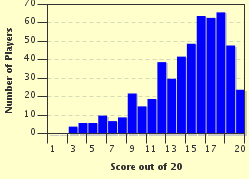Quiz Answer Key and Fun Facts
1. Which future US president was the main subject of the movie "PT-109"?
2. Which US president temporarily moved out of the White House to Blair House for an extended period while the interior of the White House was completely gutted and rebuilt with steel beams? (Hint: The buck stops here.)
3. Which US president said "Ich bin ein Berliner" in a famous speech?
4. After a negative review of his daughter's singing by a newspaper music critic, which US president wrote a letter to the music critic that included these words: "Someday I hope to meet you. When that happens you'll need a new nose, a lot of beefsteak for black eyes, and perhaps a supporter below."?
5. Which US president got in trouble with animal lovers over pictures of him holding one of his pet beagles up by its ears?
6. Which US president used one of the first TV political ads during his initial campaign for the presidency that showed an elephant pulling a bass drum on wheels while banging on the drum (holding a drumstick with its tail) and the chant, "You like ____. I like ____. Everybody likes ___!"?
7. Which of these US presidents survived two or more assassination attempts?
8. Which US president started the US Interstate Highway System?
9. Which US president had a brother whose name was used as a brand of beer?
10. Which future US president was a member of the Warren Commission that investigated JFK's assassination?
11. Which US president was photographed holding up a newspaper with the headline "Dewey Defeats ______"?
12. Which future US president reported seeing a UFO (unidentified flying object) in 1969 (before he became president)?
13. Which US president had a wife who was a professional dancer in her youth, eventually dancing at Carnegie Hall in New York City?
14. Which US president was a Rhodes Scholar?
15. Who was the US president who had a VP who made a televised speech in which he described being given a pet dog named Checkers? (Hint: Don't rush when reading this question.)
16. Which of these US presidents did NOT have wartime military experience BEFORE becoming president?
17. Which US president wrote a children's book after he left office?
18. Which US president had a daughter married in a White House Rose Garden ceremony?
19. Which US president turned down two offers to play pro football (American style)?
20. Which US president played a musical instrument on national American TV (while he was a candidate)?
Source: Author
root17
This quiz was reviewed by FunTrivia editor
stedman before going online.
Any errors found in FunTrivia content are routinely corrected through our feedback system.


